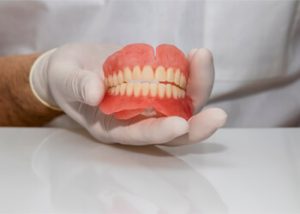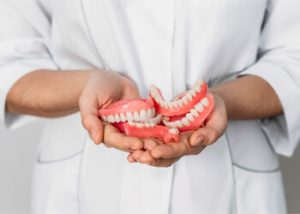Before and After Dentures — What to Expect on the Treatment

Missing teeth can be a significant change that negatively impacts your life due to the lack of self-confidence it creates. Who wants to smile when they’re embarrassed about their teeth? However, you don’t have to feel this way forever because there are ways to restore your beautiful smile.
In this article, we’ll discuss dentures, one of the most common methods of cosmetic dentistry to replace your missing teeth, and what to expect before and after dentures.
Before Getting Dentures
There are several disadvantages to having missing teeth, but looking through a before and after gallery with your dental practitioner can show you the drastic improvement dentures can make. The effects of missing teeth include the following:
Difficulty eating
Not only do your teeth play a vital role in chewing your food, but they also affect how much enjoyment you get out of eating. When you’re missing multiple teeth, it can make chewing difficult and uncomfortable – ultimately impacting the taste and satisfaction you get from meals.
 Difficulty speaking
Difficulty speaking
In addition to your lips and tongue, your teeth help regulate airflow from your mouth, which is key for speaking clearly. Any issues you have with oral health will consequently affect both the clarity of your speech as well as other people’s ability to comprehend you.
Effects on your confidence
When you feel self-conscious about your smile, it takes a toll on your mental health and how you see yourself. Without treatment, this can result in less smiling and even avoidance of social situations.
Changes to your facial appearance
When you lose teeth, your cheeks may start to look sunken due to the change in facial volume. Without teeth, your lips might also sink in. If you wait too long before getting dentures, you might experience bone loss in your jaw, which further impacts how your face looks.
Dentures Procedure
Your dentist will evaluate the condition of your mouth and gums. They may recommend extractions, if necessary, or advise you to wait until they can better assess the health of your teeth. In addition, they’ll take measurements that are crucial in designing a set of custom-made dentures for your smile.
After your set of dentures is made, your dentist will fit and adjust them to ensure they are secure, comfortable and properly aligned. Before you leave with them, they’ll provide you with instructions on how to care for your dentures as well as possible side effects that may occur while you’re getting used to wearing them.
After receiving dentures, it’s important to remember that you’ll get used to them gradually. Speak slowly and practise reading aloud at first in order to get used to the way your dentures fit and feel in your mouth. Over time, you’ll become more comfortable with them and will no longer need assistance when talking or eating.
Different types of dentures
There are different types of dentures available, and there are many factors that determine the best option for you, whether you’d prefer removable or fixed dentures or you need very natural-looking dentures for front teeth.
These types of dentures include the following:
Partial Dentures
A removable partial denture typically consists of replacement teeth affixed to a pink or gum-coloured plastic base, which is sometimes connected by metal clasps that hold the denture in place. Partial dentures are used when one or more natural teeth remain but need support for chewing purposes. Partial dentures are coloured to match your remaining teeth.
Implant-Supported Dentures
This type of fixed denture is held in place by dental implants.
Implant-Retained Dentures
Also called snap-on dentures, work by attaching a removable set of dentures to only one or two dental implants. This provides the benefit of easy removal and cleaning and is also more affordable than options that require more implants.
Full/Complete Dentures
Full dentures replace all the teeth in your upper or lower jaw. Dental adhesives are used to keep dentures in place and improve your smile. They also help you eat normally.
 Upper and lower dentures
Upper and lower dentures
Upper and lower dentures replace all of the teeth on both your upper and lower jaws. These dentures have an acrylic, plastic base which acts as the “gum” to which your new false teeth are fitted.
No matter what type of denture you decide on, proper oral hygiene is still essential to maintaining healthy gums and preventing any possible infections or other complications.
How to take care of your dentures?
Taking care of your dentures is also an important factor to consider to avoid any discolouration or damage so that they last for a long time.
- Rinse your dentures after eating to remove any food debris.
- Soak them overnight to keep them moist and allow them to hold their shape.
- Clean your mouth after you take off your dentures using a soft-bristled toothbrush.
- Visit your dentist regularly for check-ups and adjustments as needed.
By following these simple tips, you can enjoy the benefits of having dentures and showing off your beautiful smile!
After Using Dentures
Dentures are an effective solution that can dramatically improve your oral health, speaking and eating abilities, and the overall appearance of your smile. Some pros of using dentures can include:
- Improved ability to chew and speak
- Healthy teeth and gums
- A more youthful appearance
- Increased self-confidence
- Improved digestion due to better chewing abilities
- Reduced risk of infection by preventing the overgrowth of bacteria.
Dentures are a great way to replace your missing teeth and regain confidence, and have a perfect smile. With proper care, you can ensure that your dentures last for as long as possible so that you can enjoy the benefits of having natural teeth.
Are Dentures The Right Option For You?
The best way to find out whether you’re a good candidate for dentures or not is by getting an experienced consultation from the dental team at My Local Dentists. With five locations conveniently spread across Sydney, it’s easier than ever to book your appointment now and start the journey of restoring your smile.
Note: Any surgical or invasive procedure carries risks. Before proceeding, you should seek a second opinion from an appropriately qualified health practitioner.
References
What are the different types of dentures?
https://www.dentaly.org/en/dentures-false-teeth/types-of-dentures/
Dental health and dentures
https://www.webmd.com/oral-health/dental-health-dentures#091e9c5e80007bb0-1-3
Dentures policy and procedure
https://leadingageil.org/resources/2017/Resource%20Library/ROPs/Dental%20Services/Dentures/2-Dentures%20Policy%20and%20Procedure%20v2.pdf
Dentures care: How do I clean dentures?
https://www.mayoclinic.org/denture-care/expert-answers/faq-20058375#:~:text=Brush%20your%20dentures%20at%20least%20daily.&text=Soak%20and%20brush%20them%20with,denture%20cleansers%20inside%20your%20mouth.
